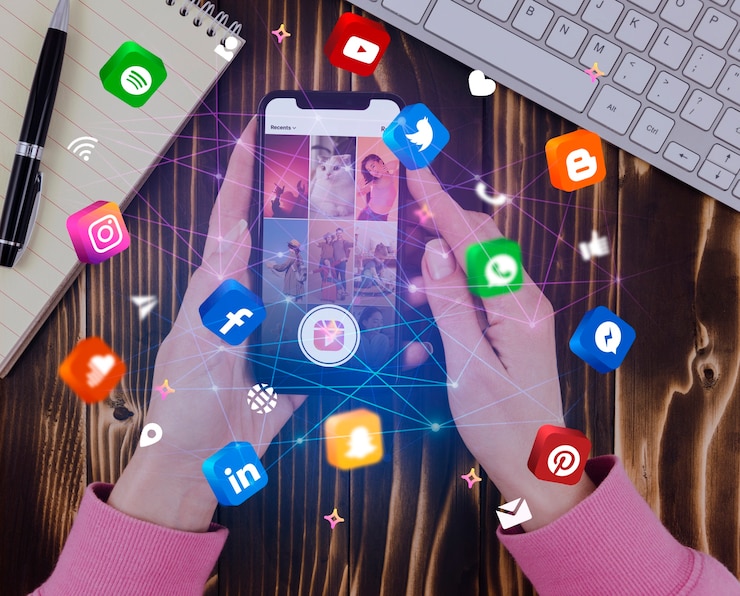Introduction
In the 21st century, social media has become one of the most influential aspects of human life. It is not just a tool for communication but also a platform for learning, entertainment, business, marketing, and even politics. Billions of people across the globe log into platforms such as Facebook, Instagram, TikTok, formerly Twitter LinkedIn, and YouTube every single day. Social media is reshaping how individuals connect with each other, how businesses interact with customers, and how governments communicate with citizens. This article explores the history, importance, benefits, drawbacks, and future of social media in depth.onanyway.
The History and Evolution of Social Media
The concept of social networking is not new; it started long before Facebook or Instagram. Early platforms such as SixDegrees.com (1997) and Friendster (2002) were among the first websites Sto allow people to create profiles and connect with friends online. Then came MySpace (2003), which became extremely popular before Facebook overtook it in 2004.
The launch of Facebook revolutionized the digital world. Unlike earlier platforms, Facebook offered a cleaner interface, news feed, and opportunities for businesses to connect with audiences. Soon after, YouTube (2005) emerged as a video-sharing giant, Twitter (2006) introduced microblogging, and Instagram (2010) focused on visual storytelling.
The social media landscape continues to evolve. Today, platforms such as TikTok, Snapchat, and LinkedIn cater to different demographics and purposes. The shift towards short-form video content, live streaming, and artificial intelligence integration highlights how rapidly social media adapts to changing user behaviors.
Importance of Social Media in Modern Life
Social media plays a central role in modern society. Its importance can be seen in various aspects:
- Global Connectivity – It allows people to communicate instantly, regardless of distance. Families, friends, and professionals remain connected through messages, video calls, and updates.
- Information Sharing – News spreads faster on social media than on traditional media. From breaking news to public awareness campaigns, social media keeps people informed.
- Education – Platforms like YouTube, LinkedIn Learning, and Facebook groups provide free access to learning materials, tutorials, and online discussions.
- Business and Marketing – Companies use social media to market products, provide customer service, and build brand loyalty.
- Entertainment – Social media is a source of music, memes, short videos, and cultural trends.
- Activism – Social movements such as #MeToo and climate change campaigns gained global recognition through social media.
Positive Impacts of Social Media
- Bridging Distances – Social media reduces geographical barriers by making communication instant and affordable.
- Awareness and Knowledge – It spreads knowledge about health, safety, education, and global issues.
- Opportunities for Growth – Many people have built careers as influencers, content creators, and entrepreneurs.
- Business Growth – Startups and small businesses use social media advertising to reach global audiences with limited budgets.
- Emergency Response – During crises such as natural disasters, social media helps spread vital information quickly.
Negative Impacts of Social Media
Despite its benefits, social media has serious drawbacks:
- Addiction and Mental Health Issues – Constant scrolling leads to reduced productivity, anxiety, depression, and low self-esteem.
- Cyberbullying – Many users, especially teenagers, face harassment and online bullying.
- Privacy Concerns – Sharing personal information online increases the risk of identity theft and data misuse.
- Spread of Misinformation – Fake news, conspiracy theories, and propaganda spread rapidly, sometimes with dangerous consequences.
- Reduced Physical Interaction – Overuse of social media reduces face-to-face communication, weakening social bonds.
Role of Social Media in Business and Marketing
Social media has transformed marketing into a two-way communication process. Businesses no longer rely only on TV or newspaper ads. Instead, they engage with customers directly through posts, comments, and messages.
- Advertising: Platforms like Facebook Ads and Instagram Ads allow targeted marketing, reaching specific age groups, locations, and interests.
- Brand Image: Companies build reputations through engaging content, customer reviews, and influencer partnerships.
- Customer Service: Customers expect brands to respond quickly on social platforms.
- E-commerce Integration: Instagram shops, Facebook Marketplace, and TikTok shopping features have made buying and selling easier.
Many businesses now allocate a significant portion of their marketing budget to social media. This shows its undeniable role in modern commerce.
Future of Social Media
The future of social media will be shaped by artificial intelligence, virtual reality, and personalization. Features like AI chatbots, VR meeting spaces, and immersive shopping experiences will likely dominate. Privacy and regulation will also play an important role, as governments introduce laws to combat misinformation and data misuse.
Another major trend is social commerce, where social platforms directly integrate shopping experiences. Influencers will continue to grow as key marketing partners. Additionally, short-form video and live content are expected to remain at the center of digital engagement.
Conclusion
Social media is both a blessing and a challenge. It has connected the world, opened new business opportunities, and created platforms for learning and entertainment. At the same time, it has brought issues of addiction, misinformation, and privacy risks.
The key is to use social media wisely. By focusing on quality content, balancing online and offline life, and protecting personal information, individuals and organizations can maximize the benefits while minimizing the harms.
In conclusion, social media is not just a tool—it is a powerful force shaping the present and the future of humanity. Whether in communication, business, education, or activism, its impact is undeniable. The next decades will only strengthen its role, making it essential for everyone to understand and use responsibly.
Do you want me to also make a shorter summary (500 words) version of this article that you can use for quick reading or presentations?
Top of Form
Bottom of Form

